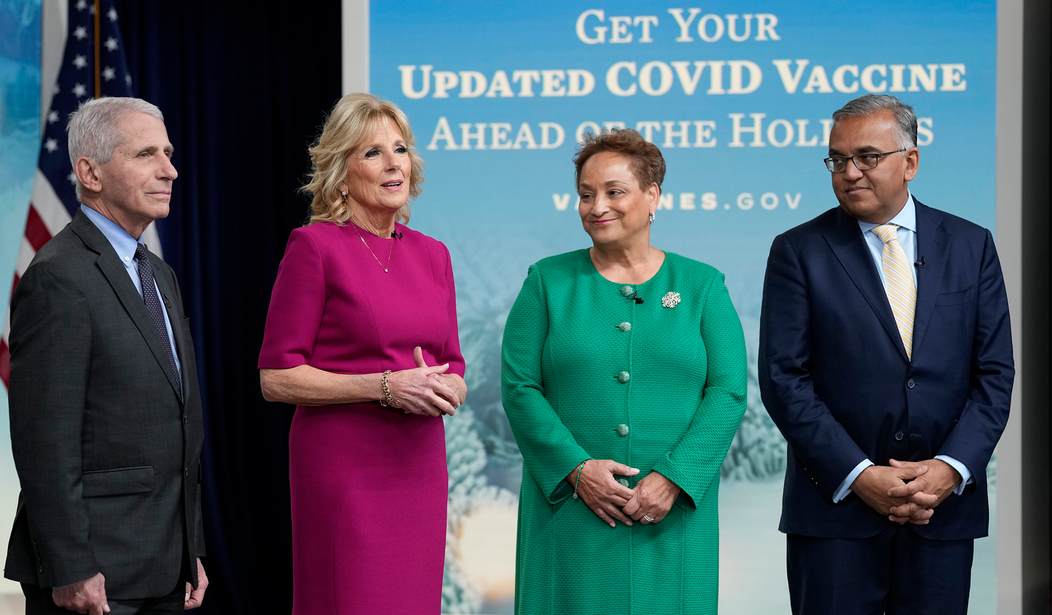Imagine you're sitting in a doctor's office and they tell you it's time for a major health decision that could change the course of your life forever. If you go with the doctor's recommendation, heart attack, stroke, paralysis, hearing changes, and blood clots are rare but potential side effects. If you decline the doctor's recommendation, you may experience nausea, fatigue, sore throat, diarrhea, loss of taste, and difficulty breathing. You have sixty seconds to decide. The doctor urges you to take his recommendation, says it is worth the risk and will benefit everyone around you. You trust the expert, don't you? Did you ever think to push back on the time limit? Probably not.
"Amateur" is rooted in Latin; it means to love without intent to gain. In other words, if you are an amateur, you love something without doing it professionally. I am an amateur chef because I love cooking and have zero interest in working in a professional kitchen. It is unfortunate that "amateur" has been made into a pejorative and demeaning term, because there is wonderful value in being an amateur.
Expert, on the other hand, is a prestigious and noble title. Unlike amateurs, experts do not require love for their subject; the Latin root of "expert" means "to try" or "to test." Compare the words "expert" and "experience" and tell me where love, zeal, or passion are required. Experts leverage their knowledge for money, reputation, and respect; amateurs do not. Herein lies the problem, Dear Reader: We are told to trust the experts, but the experts are in it for their own personal gain — it's their career and reputation and paycheck.
When President Trump and his crew of medical professionals gathered in the Roosevelt Room yesterday to announce a possible correlation between Tylenol and autism, experts crawled out of the woodwork. A quick search of "Trump Autism" reveals the vast expanse of experts we've had in our midst all along, mostly at liberal-biased news sites:
- "As Trump ties Tylenol to autism, doctors raise alarm" (The Washington Post)
- "Trump links autism to acetaminophen use during pregnancy, despite decades of evidence it's safe" (CNN)
- "Trump and RFK, Jr. promote unproven claims about autism at White House event" (NBC News)
- "Trump blames Tylenol for autism. Science doesn't back him up." (NPR)
In zero surprise to anyone reading, I am not an expert in pharmacology, obstetrics, autism, or prenatal medicine. I also have no passion, love, or zeal for any of those things. As neither medical expert nor science amateur, I come to you as a commentator and mother to tell you what you already know but might need permission to accept: stop blindly trusting the experts.
Also for our VIPs: Texas A&M: Gender Ideology Should Be in Children's Literature
These experts told us the 'Rona jab was "totally safe" and would "stop the spread" of the virus, and we now know these claims to be false. These same experts told us estrogen helps offset bone density loss and hot flashes, but they're now finding the direct link between estrogen and some types of breast cancer. These are also the very people who tell kids that puberty blockers are reversible. Remind me why we put faith in everything they say? Oh, right — they're experts.
When President Trump says acetaminophen use during pregnancy may yield a higher risk for autism, we should be asking questions instead of defending the experts. What data indicate that acetaminophen could be a factor? Who is running the exploration of this premise? Why has no one brought this to our attention before now?
We should be slow, however, to go after every medical professional with our torches and pitchforks, because there is a solid chance many of the doctors and nurses who have told us that Tylenol is safe have also been blindly following the expert advice. Remember that scenario at the top of the article? It's one we have all experienced, and more than once; even doctors and nurses are patients, too. Yes, we have questions, but they are probably dumb, and there is a line of patients after us, and the doctor's time is valuable, and — wait, why are we putting our life-altering decisions lower on the priority list than some stranger in the next room who needs a refill on their daily allergy pill?
Yes, we have questions, and yes, time is limited, but that does not mean we should belittle the consequences of our choices in favor of the time of someone whom we are paying to help us make informed decisions. We're paying a person who knows more than we do about something, but we are not going to access that knowledge because it might take a few extra minutes? It sounds absurd, right? Because it is.
Is it possible to know everything about everything? No, which is why we lean on experts to fill in our own knowledge deficiencies. If the doctor or nurse doesn't have answers, she should say so and find someone who does.
Because health and science are such complicated and nebulous things, we have been controlled by fear for decades. I have never been so concerned with every single choice to be made as I was when I was pregnant. If you listen to the experts, they'll tell a pregnant woman that deli meat is dangerous and sleeping on your back is a crime, absolutely no alcohol or tobacco, and don't even think about eating brie, because if you do any of these things, you, the mother, the giver of life, will put your baby's life at risk. Imagine living nine months believing one wrong move could literally kill your unborn child. But we go along with it because they are the experts and we are not.
What is an expectant mother to do if she cannot trust the experts charged with bringing her baby safely into the world?
It's time to channel our courage and ask questions. "Why is deli meat dangerous?" Put the doctor on the spot and make him defend the science. He should say something about listeria, and you should then ask for specific data, like "How often is listeria found in honey-glazed ham?" and "What if the meat is sliced in front of my eyes?" Keep asking questions until you are convinced either that your doctor is a breathing pamphlet of talking points or your favorite sandwich could end your pregnancy.
For too long, parents have felt bad for asking too many questions or challenging the status quo. Mothers who want to forgo some vaccines or spread them out over years instead of months have seen as many eye-rolls and heard as many frustrated sighs as a middle school teacher. "Why do we have to give three shots for a total of 10 vaccines in one day?" That is a reasonable question! "Also, why does my baby need three Diphtheria, Tetanus, and Pertussis vaccines in the first six months of her life? I thought the vaccine I was made to get for those things during my pregnancy transferred to her; isn't that why I got it?" Point to the crime in asking, because I don't see it, but dang if we aren't made to feel it.
If anything, we have learned in the last five years that we have not been asking enough questions, not because we have not had them, but because we have been too afraid. Challenging authority (questioning President Trump, Dr. Oz, RFK, Jr., and your own family practice doctor) is not wrong; it means you are thinking for yourself.
As children, we are conditioned to accept whatever authority says as true. The teacher says white men used smallpox-infected blankets to kill Native Americans, and we should feel awful about it even today, never mind that natural immunity wasn't studied for a hundred years after the fact, and it's possible European explorers did not mean to harm hundreds of thousands of people. The principal says talking back is a punishable offense, but what if you were just trying to get answers instead of being shouted down by an emotionally fragile instructor who didn't want to look incompetent?
As adults, we are pushed into the same line of compliance. The boss says you're not getting the promotion because the company needs more diversity in management, but there's no mention of merit. The doctor tells you the bloodwork looks "normal," so maybe your symptoms are just in your head; too many 40-something women experiencing early onset of menopause understand this too well. We take the explanation at face value and move on because we are not "high maintenance" and don't want to be accused of something nefarious like insubordination or conspiracy.
If we are not willing to stand up for ourselves as adults, how are we going to raise children to do just that? I don't pretend to be smart enough to know what "depleting glutathione" means, but I have no problem expecting a doctor or pharmacist to explain it to me in terms I comprehend. We are intelligent people who can reason and understand; it is not our problem if they can't get past the talking points they blindly accepted. If we expect our children to push back when a teacher says "2 + 2 = 5," then why do we accept it when experts say "COVID vaxx + new heart problems = get another booster!"
President Trump wouldn't incriminate Tylenol just because it was a slow news day, so what research led him and others to be confident enough to tell the American people the drug could be linked to autism? We are conservatives and deal with facts, not feelings. While the experts are outraged that we plebes are challenging their authority, and the legacy media is covering for them, let us ask questions until we are satisfied. Our pursuit of truth is more important than their convenience.
Being pregnant is hard; in my case, everything hurt, and there was little I could do to alleviate my pain. Taking acetaminophen has been the go-to relief for decades, but science is still science. Science is meant to be tested over and over again until it becomes irrefutable and a Law of Science, like gravity. Tylenol is not on par with gravity and, as such, should be tested again and again. President Trump is not the bad guy for asking questions here, and women and girls, current and future mothers, deserve to hear the answers.










